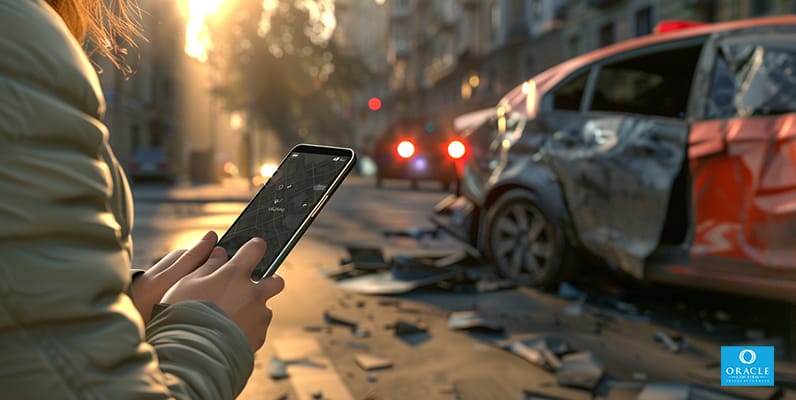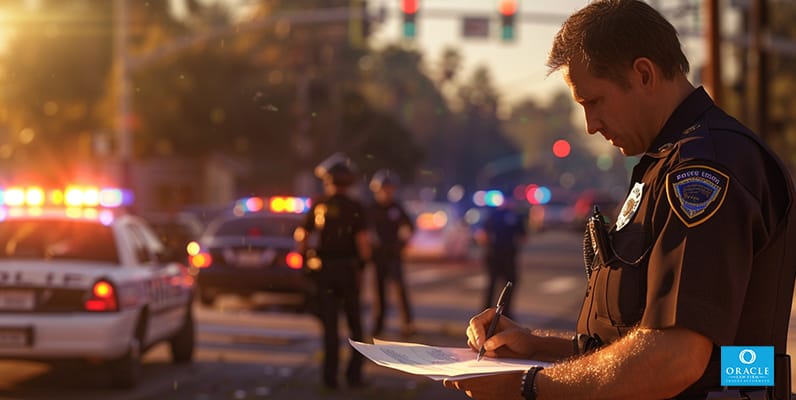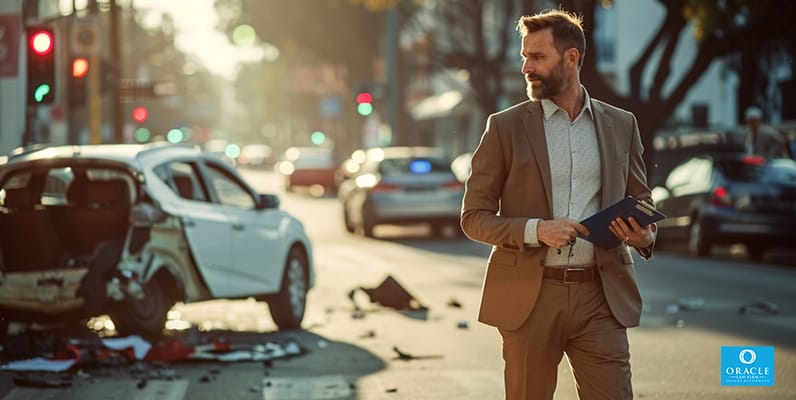What to Do When Injured in a Ridesharing Accident: Essential Steps to Take
Wondering what to do when injured in a ridesharing accident? Start by ensuring your safety, documenting the scene, and understanding how to handle insurance claims. This guide provides clear, actionable steps to help you navigate the aftermath.
Key Takeaways
- Prioritize safety by moving to a secure location, calling 911, and documenting the scene with photos and videos after a ridesharing accident.
- Report the accident to law enforcement and the rideshare company promptly, ensuring all necessary information is gathered for potential insurance claims.
- Seek immediate medical attention to address injuries and maintain detailed records of all medical visits and expenses for effective compensation claims.
Immediate Actions to Take at the Accident Scene

When a ridesharing accident occurs, the first few minutes are critical. Safety should be the top priority. Move to a secure location if possible to prevent further incidents and check for injuries. Dial 911 to report the accident and request medical assistance. This not only ensures immediate help but also creates an official record.
Next, gather information from everyone involved. Collect names, contact details, driver’s license numbers, and insurance information. Additionally, note the license plate numbers of all vehicles. Thoroughly document the accident scene with photos and videos, which will serve as valuable evidence for insurance and legal purposes.
Ensure Safety and Call 911
After a ridesharing accident, prioritize the safety of everyone at the scene. Assess for injuries and call for emergency medical assistance if necessary. Move to a safe location to prevent additional incidents. Dial 911 promptly to ensure professional help arrives and to create an official record of the accident. Many ridesharing apps, like Uber, have an in-app emergency button that sends vehicle and location information directly to 911, simplifying the process.
Seek medical attention immediately if injuries are apparent, even if they seem minor. Some injuries, like internal bleeding or concussions, may not be immediately visible but can have serious consequences if untreated. Prioritize medical assistance to avoid complications later.
Gather Information from All Parties Involved
Once safety is assured, gather information from all parties involved. This is essential for insurance claims and potential legal actions. Collect names, contact details, driver’s license numbers, and insurance information from all drivers and passengers. Also, note the license plate numbers of all vehicles involved.
If you cannot gather the information on your own, ask for help from a passenger, friend, or witness. This detailed information is crucial for processing insurance claims and any legal proceedings that may follow.
Document the Accident Scene
Documenting the accident scene is crucial. Take clear photos and videos of the scene, including vehicle damage, road conditions, and visible injuries. These visual records will serve as powerful evidence when filing a rideshare accident claim. Additionally, collect contact information from any witnesses who can provide an account of the accident.
When submitting a claim to the rideshare company’s insurer, provide a clear and factual account of the accident along with the collected evidence. This documentation will support your case and help in determining liability and the extent of damages.
Thorough documentation can make a significant difference in the outcome of your insurance claim and any legal actions that may follow.
Reporting the Rideshare Accident

Reporting the rideshare accident to the appropriate authorities ensures an official record of the incident. After ensuring safety and gathering information, contact law enforcement to file a police report. This report is essential for insurance claims and any potential legal actions. Additionally, move away from the accident scene if possible to avoid further hazards before contacting emergency services.
Notifying the rideshare company about the lyft accident is just as important. Both Uber and Lyft have specific procedures for reporting an accident, which must be followed to ensure proper handling of the case. Failure to follow these procedures may affect the outcome of any claims made.
Maintain detailed records of all communications with the rideshare company to support your case.
Report to Law Enforcement
Reporting the accident to law enforcement creates an official record that can be used during insurance claims and legal proceedings. Contact the police immediately after the accident to ensure a police report is filed. This report provides crucial documentation to support your case.
Also, take photographs of the accident scene, including the vehicles involved and any visible injuries, as this evidence will be valuable for insurance and legal purposes.
Notify the Rideshare Company
Don’t overlook notifying the rideshare company about the accident. Both Uber and Lyft make it straightforward to report an accident through their apps by following the ‘Help’ section. Provide all relevant details, including the time, location, and nature of the accident. Each rideshare company has specific procedures that must be followed to ensure proper handling of the case. Failing to adhere to these procedures may negatively impact the outcome of any claims made.
After reporting the accident, keep detailed records of all communications with the rideshare company. This documentation will be valuable in case of any disputes or follow-up actions required to resolve your claim. Following the company’s procedures and maintaining thorough records will help in navigating the post-accident process more smoothly.
Seeking Medical Attention

Seek medical attention immediately after a rideshare accident for your health and to support any claims you may need to file later. Even if you feel fine initially, some injuries may not manifest until hours or days after the accident. Addressing both physical and mental health concerns promptly can aid in a quicker recovery and prevent untreated injuries from worsening.
Keep thorough records of all medical visits, treatments, and expenses to substantiate claims with insurance companies and during legal proceedings. These records will document the extent of your injuries and the treatments received, which can be crucial evidence in your case.
Seek Medical Attention Immediately
Seek medical attention immediately after the accident to understand the extent of your injuries and prevent complications. In a rideshare accident, injuries can range from minor cuts and bruises to serious conditions like broken bones, head injuries, or internal injuries. Failing to visit the doctor immediately can create an impression of not being seriously injured, complicating your claims process later. Always prioritize getting a medical evaluation right after the accident.
Prompt medical attention ensures your well-being and provides a documented link between the accident and your injuries, which is critical for insurance and legal claims. This documentation will support your case when seeking compensation for medical treatment and other related expenses.
Keep Detailed Medical Records
Maintain thorough records of all medical visits, treatments, and expenses for effective recovery and potential claims. These records provide a comprehensive account of your health issues related to the accident, which is vital for substantiating your claims with insurance companies and during legal proceedings.
Accurate medical documentation helps track your progress and any ongoing health concerns stemming from the accident. This detailed information is crucial to ensuring you receive appropriate compensation for your injuries and related expenses.
Understanding Insurance Coverage in Rideshare Accidents

Understanding the insurance coverage available in rideshare accidents is essential for navigating the claims process. Rideshare companies like Uber and Lyft provide a $1 million third-party liability insurance policy for their drivers. This coverage applies during different phases of the ride, from waiting for ride requests to transporting passengers.
Compensation amounts following a rideshare accident depend on various factors, including the severity of injuries and the circumstances surrounding the accident. Understanding the difference between personal auto insurance and rideshare insurance can help you identify potential gaps in coverage and ensure you seek appropriate compensation.
Personal Insurance vs. Rideshare Insurance
When the Uber app is not in use, the driver’s personal insurance policy comes into effect, providing coverage during that time. In a rideshare accident, the at-fault driver is held liable, and the injured party can file a personal injury claim against their insurance. If the rideshare driver is not logged into the app during the accident, they have no insurance coverage and may be legally responsible.
Both personal car insurance and commercial car insurance can be claimed if the rideshare driver is at fault. Knowing when personal insurance and rideshare insurance apply can help you navigate the claims process more effectively and ensure you receive the compensation you deserve.
Liability Coverage During Different Ride Phases
Liability coverage varies during different phases of the ride. When the app is off, drivers have the lowest coverage amount. An uber or lyft driver provides limited liability coverage when drivers are waiting for ride requests.
When en route to pick up a passenger, drivers are covered for up to $1 million in liability for bodily injury and property damage. While transporting passengers, drivers also have $1 million in liability coverage.
Understanding these coverage phases helps determine the extent of insurance available and navigate the claims process more effectively.
Filing a Rideshare Accident Claim
Filing a rideshare accident claim involves multiple steps and can be complex. Report the accident to your personal insurance company and inform the rideshare company to prevent complications. Each rideshare company has specific protocols for reporting accidents through their apps, which must be followed.
Promptly reporting the accident enhances the chances of receiving appropriate compensation from insurance. Seeking timely medical care helps document injuries directly linked to the accident. Delaying treatment can complicate proving that injuries were caused by the accident.
Keep copies of all medical bills, as this documentation is essential for your claims.
Contact Your Own Insurance Company
Inform your personal insurance provider about the rideshare accident, as they may have specific procedures for processing your claim. Reporting the accident ensures they have your account of the incident. An experienced lawyer can handle all communications with insurers, ensuring your claim is properly managed.
Rideshare accident attorneys often work on a contingency fee basis, meaning they only get paid if you win your case. This arrangement provides access to legal expertise without upfront costs, and you can also request a free consultation.
File a Claim with the Rideshare Company’s Insurance
Filing a claim with the rideshare company’s insurance involves submitting necessary documentation and cooperating with the claims adjuster. The adjuster assesses the claim by interviewing all parties involved, helping to determine its validity.
Providing all relevant documentation, including medical records and evidence from the accident scene, is crucial for seeking compensation after an accident. This thorough documentation will support your case and help in securing appropriate compensation for your injuries and related expenses.
Legal Considerations and Hiring an Attorney
Navigating the legal complexities after a rideshare accident can be daunting. Hiring an experienced personal injury lawyer can significantly enhance your chances of receiving full compensation. These lawyers understand the specific legal nuances of rideshare incidents and can guide you through the claims process effectively.
Gathering all relevant documentation, including accident reports and medical records, is crucial to support your case. An Uber accident attorney or rideshare accident lawyer can help determine liability, investigate the accident, and handle communications with the rideshare company and insurance providers.
Determining Liability and Proving Fault
Determining liability in a rideshare accident often involves multiple parties, making legal guidance critical. Consulting an experienced personal injury lawyer is essential to establish liability and gather evidence. Liability can fall on the rideshare driver, the rideshare company, or other drivers involved in the accident.
After submitting a claim, the rideshare company’s insurance provider will conduct an investigation to assess the details of the accident. Rideshare companies may also conduct their own investigation when a claim is filed.
It is advisable to refer all communications with rideshare representatives to your attorney to ensure your rights are protected.
Benefits of Hiring an Experienced Car Accident Lawyer
Hiring an experienced car accident lawyer ensures that you have an advocate who understands the unique regulations surrounding rideshare cases. These lawyers specialize in navigating the complexities of rideshare accident claims, offering you dedicated legal expertise.
An experienced car accident lawyer has the negotiation skills necessary to effectively deal with insurance companies and ensure fair compensation is pursued. Having a lawyer on your side allows you to focus on your recovery while they handle the legal complexities of your case.
Potential Compensation After a Rideshare Accident

After a rideshare accident, you may be entitled to maximum compensation for your injuries based on various circumstances. The recovery process can take months or even years, leading to significant medical expenses and financial instability. Understanding the types of compensation available can help you seek appropriate compensation for your injuries and related losses.
Compensation can cover medical bills, lost wages, and pain and suffering. Each of these components plays a crucial role in the overall compensation package.
Medical Bills and Treatment Costs
After a rideshare accident, it’s crucial to understand both current and future medical expenses. Current expenses may include hospital bills, medications, and ongoing treatments necessary for recovery. Future medical costs could involve long-term therapies or surgeries that arise from injuries sustained in the accident.
Maintaining detailed medical records and documentation of all visits, treatments, and expenses is vital for substantiating your claims and seeking appropriate compensation. This documentation will play a significant role in your compensation claims process after a rideshare accident.
Lost Wages and Earning Capacity
Injuries that prevent you from working can lead to claims for lost income. You may seek compensation for lost wages due to your inability to work and for impacts on your future earning potential in a personal injury lawsuit.
These claims can help mitigate the financial instability caused by the accident.
Pain and Suffering
Pain and suffering encompass financial compensation for both physical pain and emotional distress experienced after a ridesharing accident. This compensation addresses the significant physical pain from injuries and the emotional distress, such as anxiety, depression, or PTSD, resulting from the trauma of the accident.
The reduction in quality of life and the impact on daily activities and relationships are also considered in compensation claims.
Summary
Navigating the aftermath of a rideshare accident can be overwhelming, but knowing the essential steps to take can make a significant difference. Ensuring safety, reporting the accident, seeking prompt medical attention, understanding insurance coverage, and filing claims effectively are crucial. Hiring an experienced car accident lawyer can help you navigate the legal complexities and secure fair compensation for your injuries and losses. If you find yourself in a rideshare accident, remember these steps to protect your rights and well-being.
Frequently Asked Questions
What should I do immediately after a rideshare accident?
Immediately after a rideshare accident, ensure everyone’s safety, call 911, and gather information from all parties involved while documenting the accident scene. This will be crucial for any potential claims or investigations.
Why is it important to report the accident to law enforcement and the rideshare company?
It is crucial to report the accident to law enforcement to create an official record, which is essential for insurance claims and legal actions. Additionally, notifying the rideshare company ensures compliance with their specific procedures.
Why should I seek medical attention immediately after a rideshare accident?
Seeking immediate medical attention after a rideshare accident is crucial for early identification and treatment of injuries, which can prevent complications and ensure you have documented evidence for any potential claims.
How does insurance coverage work in rideshare accidents?
Insurance coverage in rideshare accidents primarily consists of liability coverage provided by the rideshare company, which varies based on the phase of the ride. Personal insurance typically applies when the app is off, while rideshare insurance is active when the app is in use.
What are the benefits of hiring an experienced car accident lawyer after a rideshare accident?
Hiring an experienced car accident lawyer after a rideshare accident is beneficial as they possess knowledge of rideshare regulations, adeptly negotiate with insurance companies, and work to ensure you receive fair compensation for your injuries and losses.






